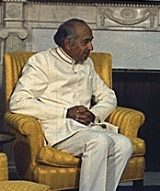
Constitution of Pakistan
Overview
Urdu
Urdu is a register of the Hindustani language that is identified with Muslims in South Asia. It belongs to the Indo-European family. Urdu is the national language and lingua franca of Pakistan. It is also widely spoken in some regions of India, where it is one of the 22 scheduled languages and an...
: آئین پاکستان ) is the supreme law of Pakistan
Pakistan
Pakistan , officially the Islamic Republic of Pakistan is a sovereign state in South Asia. It has a coastline along the Arabian Sea and the Gulf of Oman in the south and is bordered by Afghanistan and Iran in the west, India in the east and China in the far northeast. In the north, Tajikistan...
. Known as the Constitution of 1973, it was drafted by the government of Zulfikar Ali Bhutto
Zulfikar Ali Bhutto
Zulfikar Ali Bhutto was 9th Prime Minister of Pakistan from 1973 to 1977, and prior to that, 4th President of Pakistan from 1971 to 1973. Bhutto was the founder of the Pakistan Peoples Party — the largest and most influential political party in Pakistan— and served as its chairman until his...
and, following additions by the opposition parties, was approved by the legislative assembly on April 10, 1973. It was Pakistan's first ever constitution by consensus unlike two earlier constitutions, the Constitution of 1956
Constitution of Pakistan of 1956
The Constitution of 1956 was the fundamental law of Pakistan from March 1956 until the Revolution of October 1958.-Origins:Pakistan became independent of the United Kingdom in 1947. Under Section 8 of the Indian Independence Act, 1947, the Government of India Act, 1935 became, with certain...
and the Constitution of 1962
Constitution of Pakistan of 1962
The Constitution of 1962 was the fundamental law of Pakistan from June 1962 until martial law was declared in March 1969. It was eventually replaced by the current Constitution of 1973.-Origins:...
.
Pakistan's constitution
Constitution
A constitution is a set of fundamental principles or established precedents according to which a state or other organization is governed. These rules together make up, i.e. constitute, what the entity is...
provides for a parliamentary system
Parliamentary system
A parliamentary system is a system of government in which the ministers of the executive branch get their democratic legitimacy from the legislature and are accountable to that body, such that the executive and legislative branches are intertwined....
of government with the President of Pakistan
President of Pakistan
The President of Pakistan is the head of state, as well as figurehead, of the Islamic Republic of Pakistan. Recently passed an XVIII Amendment , Pakistan has a parliamentary democratic system of government. According to the Constitution, the President is chosen by the Electoral College to serve a...
as head of state
Head of State
A head of state is the individual that serves as the chief public representative of a monarchy, republic, federation, commonwealth or other kind of state. His or her role generally includes legitimizing the state and exercising the political powers, functions, and duties granted to the head of...
and a popularly elected Prime Minister
Prime Minister of Pakistan
The Prime Minister of Pakistan , is the Head of Government of Pakistan who is designated to exercise as the country's Chief Executive. By the Constitution of Pakistan, Pakistan has the parliamentary democratic system of government...
as head of government
Head of government
Head of government is the chief officer of the executive branch of a government, often presiding over a cabinet. In a parliamentary system, the head of government is often styled prime minister, chief minister, premier, etc...
.
Unanswered Questions

